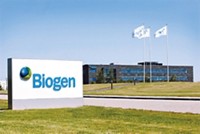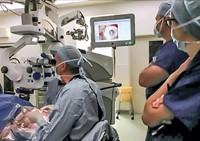Advertisement
Grab your lab coat. Let's get started
Welcome!
Welcome!
Create an account below to get 6 C&EN articles per month, receive newsletters and more - all free.
It seems this is your first time logging in online. Please enter the following information to continue.
As an ACS member you automatically get access to this site. All we need is few more details to create your reading experience.
Not you? Sign in with a different account.
Not you? Sign in with a different account.
ERROR 1
ERROR 1
ERROR 2
ERROR 2
ERROR 2
ERROR 2
ERROR 2
Password and Confirm password must match.
If you have an ACS member number, please enter it here so we can link this account to your membership. (optional)
ERROR 2
ACS values your privacy. By submitting your information, you are gaining access to C&EN and subscribing to our weekly newsletter. We use the information you provide to make your reading experience better, and we will never sell your data to third party members.
Pharmaceuticals
Rare Disease Firms BioMarin And Prosensa To Merge
Biotechnology: Deal is next twist in race to get DMD drug approved
by Lisa M. Jarvis
December 1, 2014
| A version of this story appeared in
Volume 92, Issue 48
Roller Coaster
Prosensa’s Duchenne muscular dystrophy drug drisapersen has seen some ups and downs over the past five years.
◾ October 2009 GlaxoSmithKline (GSK) licenses drisapersen from Prosensa.
◾ September 2013 The compound fails a Phase III study.
◾ January 2014 GSK returns rights to Prosensa.
◾ June 2014 FDA tells Prosensa it can file for approval but will need to conduct two more studies.
◾ October 2014 Prosensa begins a New Drug Application.
◾ November 2014 BioMarin agrees to acquire Prosensa.
In a risky but potentially profitable deal, orphan disease drug specialist BioMarin Pharmaceutical will pay $680 million to acquire Prosensa, a Dutch biotech firm with a late-stage compound to treat Duchenne muscular dystrophy (DMD), a rare, fatal disease. Prosensa shareholders could get another $160 million if the drug, drisapersen, gets approved in both the U.S. and Europe.
The deal adds yet another twist in the race to get a treatment for DMD, which affects only males, to market. Prosensa is neck and neck with Sarepta Therapeutics, a Cambridge, Mass.-based biotech that is developing its own DMD drug, eteplirsen. Both drugs use antisense technology that enables the production of a shortened version of dystrophin, a critical protein that is missing from the muscles of boys with DMD.
Drisapersen could become the biggest product in BioMarin’s portfolio, the firm’s CEO, Jean-Jacques Bienaimé, said in a presentation discussing the acquisition.
But drisapersen has a checkered past: GlaxoSmithKline licensed the drug in 2009, only to return it to Prosensa earlier this year after a Phase III study failed to prove it could help boys with DMD walk better. Prosensa argues that data from a smaller Phase II study suggest the drug helps boys with less-advanced disease.
FDA is allowing Prosensa to file for approval of drisapersen—a process the company began in October—but it is requiring two additional studies. If the results from those trials come back negative, the drug could be pulled from the market.
Although BioMarin went to great pains in its presentation to make the case for approval of drisapersen based on existing data, industry watchers see significant uncertainty. “We think there is much risk,” Cowen & Co. stock analyst Phil Nadeau wrote in a note to investors. With two failed studies, “there a good chance that the regulators require another Phase III prior to approval.”
But Nadeau also points out that the potential rewards are great: Because DMD has no approved treatment, the market for drisapersen could be as much as $3 billion per year.




Join the conversation
Contact the reporter
Submit a Letter to the Editor for publication
Engage with us on Twitter